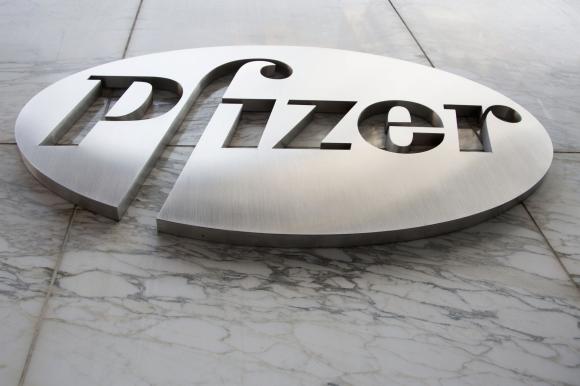
CREDIT: REUTERS/ANDREW KELLY
(Reuters) – Britain’s AstraZeneca on Monday rejected a sweetened and “final” offer from Pfizer, undermining the U.S. drugmaker’s plan for a merger to create the world’s biggest pharmaceuticals group.
The rebuff came nine hours after Pfizer said on Sunday it had raised its takeover offer to 55 pounds a share, or around 70 billion pounds ($118 billion) in total, and would walk away if AstraZeneca did not accept it.
The rejection left some major shareholders fuming as shares in AstraZeneca slumped 11 percent, trading at 43 pounds at 1445 GMT after falling as much as 15 percent – their biggest ever intra-day decline. Pfizer climbed 1.5 percent in New York.
AstraZeneca Chairman Leif Johansson told Reuters he now saw no prospect of a deal with Pfizer before a deadline of May 26 set under British takeover rules, or any likelihood of that deadline being extended.
Pfizer wants to create the world’s largest drugs firm, with a headquarters in New York but a tax base in Britain, where corporate tax rates are lower than in the United States. The plan has met entrenched opposition from AstraZeneca, as well as politicians and scientists who fear cuts to jobs and research.
“It died of multiple wounds. Too little cash, too many suspicions about Pfizer’s motives, and too little confidence in its assurances about jobs,” said Erik Gordon, professor at the University of Michigan’s Ross School of Business. “Pfizer’s chances are going down, despite its offer of a higher price.”
Johansson said he had made clear in discussions with Pfizer that his board could only recommend a bid that was at least 10 percent above an offer of 53.50 pounds made by Pfizer on Friday, or 58.85 pounds. He blamed Pfizer for calling a halt to discussions after a telephone call lasting more than an hour with Pfizer’s chairman and CEO Ian Read on Sunday afternoon.
In addition to the inadequate price, Johansson also slammed the lack industrial logic behind Pfizer’s move; the risks posed to shareholders by the controversial tax plans; and the threat to life science jobs in Britain, Sweden and the United States.
“Pfizer’s approach throughout its pursuit of AstraZeneca appears to have been fundamentally driven by the corporate financial benefits to its shareholders of cost savings and tax minimisation,” Johansson said in a statement.
“From our first meeting in January to our latest discussion yesterday, and in the numerous phone calls in between, Pfizer has failed to make a compelling strategic, business or value case.”
But many of Johansson’s shareholders were deeply unimpressed. “We do not think the Astra management have done a good job on behalf of shareholders,” said one fund manager at a top-10 investor in the group.
Alastair Gunn of top-30 shareholder Jupiter Fund Management said: “We are disappointed the board of AstraZeneca has rejected Pfizer’s latest offer so categorically. They should have at least engaged in a constructive conversation with Pfizer.”
However, Pfizer’s proposed takeover, which would be the largest-ever foreign acquisition of a British company, is opposed by many scientists and politicians who fear it would undermine Britain’s science base.
The U.S. group said its new offer was final and could not be increased. It said it would not make a hostile offer directly to AstraZeneca shareholders and would only proceed with an offer with the recommendation of the AstraZeneca board.
Pfizer had also increased the cash element in its offer to 45 percent, under which AstraZeneca shareholders would get 1.747 shares in the enlarged company for each of their AstraZeneca shares and 24.76 pounds in cash.
The new offer represents a 15-percent premium over the current value of a cash-and-share approach made on May 2 – worth 50 pounds a share at the time – which was also swiftly rejected by AstraZeneca.
Pfizer’s Read said he believed his proposal was “compelling” for AstraZeneca shareholders and expressed frustration at its refusal to talk, urging the British company’s shareholders to pressure its board to engage.
TAKE A BREAK
In the absence of further discussions or an extension of the deadline for making a firm offer under British takeover rules, Pfizer’s proposal will expire at 12 p.m. ET (1600 GMT) on May 26. After that, it would have to wait six months before making another bid.
“AstraZeneca will have six months to demonstrate that it was right to reject Pfizer’s offer, or face the prospect of a fresh approach,” said analyst Mick Cooper at Edison Investment Research.
While Pfizer would have to wait on the sidelines until November, it would be possible for AstraZeneca to initiate talks from late August, if it decided it wants coax a higher offer.
The latest increased offer had been widely expected. Pfizer said last week it would consider a higher offer as it urged AstraZeneca’s board to enter talks.
The British firm has laid out details of its pipeline of new drugs and argues it has no need for a deal. However, many analysts believe its projections that it can increase sales by 75 percent to $45 billion a year by 2023 are over-optimistic.
There has been a mounting political backlash against the proposed deal in Britain, the United States and Sweden, where AstraZeneca has half its roots.
The Swedish government launched a concerted effort on Friday against a merger that it fears will lead to cuts in science jobs and research, echoing concerns aired by British lawmakers at two parliamentary hearings last week, and fears for U.S. jobs in states where AstraZeneca has a large presence.
British Prime Minister David Cameron has said he wanted more assurances from Pfizer, in the event of a takeover, although as the head of the free-market Conservative Party he does not want to be seen to be deterring foreign corporate investment.
Pfizer gave a five-year commitment to complete AstraZeneca’s new research center in Cambridge, retain a factory in northern England and put a fifth of its research staff in Britain, but added that these pledges could be adjusted if circumstances changed “significantly”.
The tax aspects of the deal, meanwhile, have sparked anger in the United States, where lawmakers are now considering legislation to prevent what are known as corporate inversions, under which U.S. companies re-incorporate overseas to avoid U.S. taxes.
Inversions have helped fuel a wave of deals in the pharmaceuticals sector in recent months. Buying AstraZeneca would allow Pfizer to carry out the largest such deal yet.
